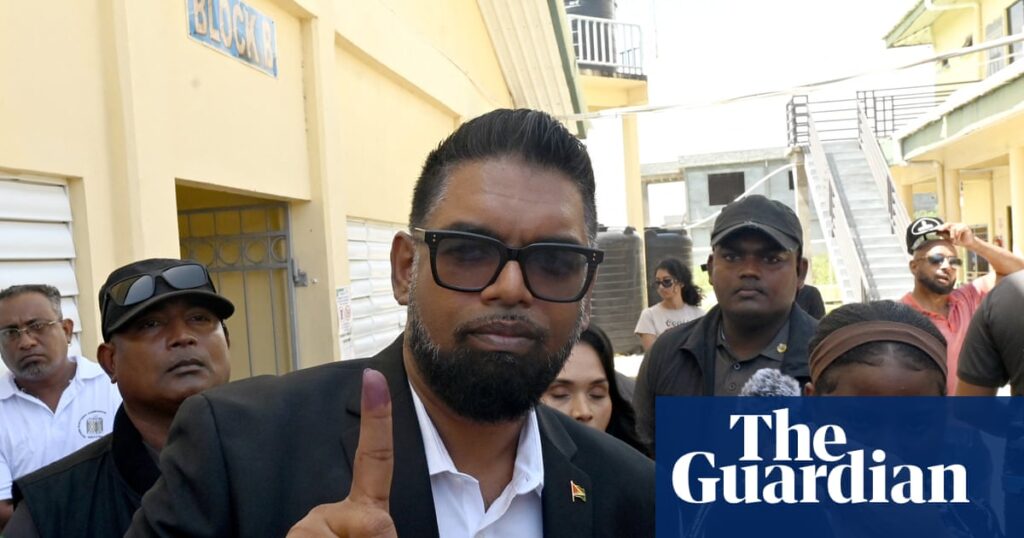Guyana’s president, Irfaan Ali, has proclaimed victory in this week’s general and regional elections after his party won more than 240,000 votes and seven of the country’s ten electoral districts.
“The results are all out there, as published by the Guyana elections commission. The numbers are clear. The people have spoken in an overwhelming way. We have won these elections with a remarkable margin,” he told the Guardian on Wednesday.
Tasked with turning the South American nation’s newfound oil riches into prosperity while navigating tensions with neighbouring Venezuela, Ali faces the uphill challenge of reconstructing a country with the highest proven crude oil reserves per capita but one of the highest poverty levels in Latin America.
According to a 2024 report by the Inter-American Development Bank, 58% of Guyanese live in poverty despite an oil boom that has quadrupled the state budget since production began in 2019.
Official final results of Monday’s vote have not yet been published and some parties have called for a recount in some electoral districts, but preliminary numbers show a shake-up for the South American country’s opposition. The upstart, We Invest in Nationhood (Win) party, which was founded just three months ago by business magnate Azruddin Mohamed, is currently second in terms of votes.
With more than 109,000 votes, one district and the possibility of another, Win is set to dethrone the longstanding A Partnership for National Unity (APNU) as the country’s main opposition. At the latest tally, APNU, which was in power before Ali took office in 2020, had just under 78,000 votes.
Amanzia Walton-Desir, who stood in the presidential race, lamented that Guyanese are still poor despite “wealth coming into this country like we’ve never had.”
She argued that government spending on infrastructure and social subsidies were contributing to inflation.
Ali’s party, the People’s Progressive Party/ Civic (PPP/C) will win the most votes in Region Four, the country’s largest electoral district and one that the party has never won since Guyana’s independence in 1966. However, it fell short of a complete majority and will need the backing of one of the smaller parties to govern the region.
Voting to choose 65 members of parliament and a government followed months of campaigning focused on how riches from the country’s hydrocarbon boom should be spent.
The country of about 800,000 people has earned $7.5bn in revenue from oil sales and royalties since ExxonMobil started pumping offshore oil in late 2019, making Guyana one of the world’s fastest-growing economies.
“We have delivered everything we set out to do over the last five years and that is why they trust us with our vision and agenda for the next five years,” Ali told the Guardian.
His government has channelled oil revenue into building roads, schools and hospitals, and made studying at state university free. The International Monetary Fund has listed the country’s GDP at almost US$26bn, nearly five times what it was five years ago.
But opposition parties have decried what they say is unfair distribution of oil earnings to groups connected to the ruling PPP/C. The PPP/C denies these allegations.
Win came into the race as a wildcard, but benefited from Mohamed’s strong social media following. Mohamed, a member of one of Guyana’s wealthiest families, was sanctioned alongside his father by the US over allegations they defrauded Guyana’s government of tax revenue and bribed public officials. The Mohameds have denied all wrongdoing.
Election observers from the Caribbean Community (Caricom), a bloc of 15 countries, the Commonwealth, the European Union and the Carter Centre commended the peaceful environment before and during the polls.
However, they raised concerns about the mistrust and lack of clarity over the official list of people who qualify to vote, with the Caricom statement referring to the “perceived ‘bloated’ nature of the voters list”.
Fekitamoeloa Katoa ‘Utoikamanu, chairperson of the Commonwealth observer group and former foreign affairs minister of Tonga, also expressed concerns about the “very limited implementation of the recommendations of observer groups over the years”.
Much of the crude reserves are in a region that makes up two-thirds of Guyana’s territory but is also claimed by once-rich petrostate Venezuela. A territorial dispute between the neighbours has intensified since ExxonMobil discovered the massive offshore oil deposits a decade ago.
The region has been administered by Guyana for over 100 years.

